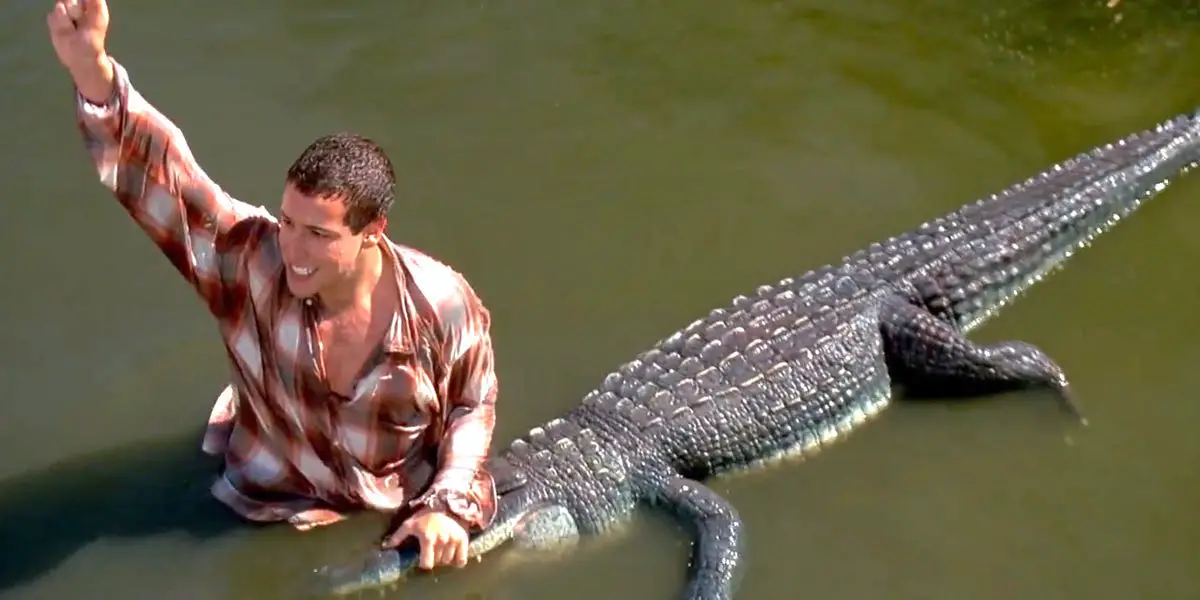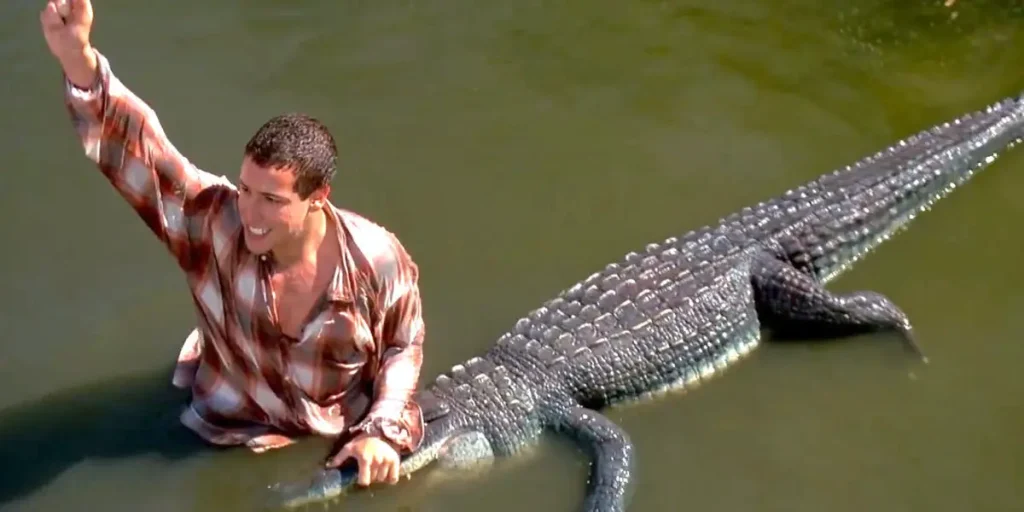Alligators are known for their fearsome reputation as fierce predators, with their powerful jaws and razor-sharp teeth. But with their massive size and impressive strength, it’s natural to wonder: do alligators attack people?
While alligator attacks on humans are rare, they do happen. In fact, there have been numerous reports of alligator attacks in the United States, particularly in the southeastern states where alligators are more prevalent. So, what are the chances of encountering an aggressive alligator in the wild? Let’s take a closer look.
Alligators may attack people if they feel threatened or if they mistake them for prey. However, these incidents are rare and can be avoided by staying away from alligator habitats, especially during their mating season. If you do encounter an alligator, it’s important to remain calm and slowly back away without turning your back on the animal. In case of an attack, fight back aggressively and aim for the alligator’s eyes and nose. Remember, alligators are wild animals and should be respected from a distance.

Do Alligators Attack People?
Alligators are fearsome and powerful reptiles that are native to North and South America. They are known for their massive size, sharp teeth, and powerful jaws. It’s natural to wonder whether alligators are a threat to humans, especially those who live in regions where alligators are present. In this article, we’ll explore the question of whether alligators attack people, and what you can do to stay safe if you encounter one.
How Often Do Alligators Attack People?
Despite their reputation as a deadly predator, alligator attacks on humans are relatively rare. According to data from the Florida Fish and Wildlife Conservation Commission, there were only 25 unprovoked alligator attacks on humans in the state of Florida between 2010 and 2019, and only five of those attacks were fatal. That means that your chances of being attacked by an alligator are extremely low.
However, it’s worth noting that alligators are still wild animals, and they can be unpredictable. As human populations continue to expand into alligator habitat, the chances of encountering an alligator are likely to increase. So, while the risk of an alligator attack is low, it’s still important to take precautions to stay safe.
What Provokes Alligator Attacks?
Most alligator attacks on humans occur when the animal feels threatened or provoked. Alligators are territorial animals, and they may attack if they feel that their territory is being invaded. They may also attack if they are startled or surprised, or if they feel that their young are being threatened.
It’s important to remember that alligators are not naturally aggressive towards humans. They would much rather avoid us altogether. However, if an alligator feels that it has no other choice but to defend itself, it may attack. That’s why it’s important to be aware of your surroundings if you’re in an area where alligators are present.
How to Stay Safe Around Alligators
If you live in an area where alligators are present, there are several things you can do to reduce your risk of an alligator attack. Here are some tips:
- Never feed alligators. Feeding alligators can cause them to lose their natural fear of humans, which can lead to more aggressive behavior.
- Avoid swimming in areas where alligators are present. Alligators are most active at dawn and dusk, so it’s best to avoid swimming during these times.
- Stay a safe distance away from alligators. If you see an alligator, stay at least 50 feet away. Alligators can move quickly on land and in water, so don’t underestimate their speed.
- Stay on designated paths and trails. Don’t wander off into areas where alligators may be hiding.
Benefits of Alligators
Despite their fearsome reputation, alligators play an important role in their ecosystem. They help to control populations of other animals, such as fish and turtles. They also help to create and maintain wetland habitats, which are important for a variety of other species.
In addition, alligators are a popular attraction for tourists in areas where they are present. Many people enjoy seeing alligators in their natural habitat and learning more about these fascinating creatures.
Alligators vs. Crocodiles
Alligators and crocodiles are often confused with each other, but there are several key differences between the two species. Here are some of the main differences:
| Alligators | Crocodiles |
|---|---|
| Shorter, wider snout | Longer, more pointed snout |
| Live in freshwater habitats | Live in saltwater habitats |
| Less aggressive towards humans | More aggressive towards humans |
In conclusion, while alligator attacks on humans are rare, it’s still important to take precautions to stay safe if you encounter one. By following the tips outlined in this article, you can reduce your risk of an alligator attack and still enjoy the natural beauty of alligator habitat.
Frequently Asked Questions
Here are some common questions people have about alligators and their behavior towards humans.
What should I do if I encounter an alligator?
If you encounter an alligator, it is important to keep a safe distance of at least 50 feet. Do not approach the alligator or attempt to feed it. If the alligator is in a public area and poses a threat to humans, contact local authorities or a wildlife conservation organization to safely remove the alligator.
If you are in an area known to have alligators, be aware of your surroundings and avoid swimming or walking near the water’s edge, especially at night when alligators are more active.
Do alligators attack humans unprovoked?
Alligator attacks on humans are rare and usually occur when humans provoke or interfere with an alligator’s natural habitat or food sources. Alligators are generally not interested in humans as prey and will usually try to avoid contact with humans if possible.
However, it is important to remember that alligators are wild animals and can be unpredictable. It is best to give alligators their space and avoid any interactions with them.
What should I do if an alligator attacks me?
If an alligator attacks you, try to fight back by hitting or kicking the alligator’s sensitive areas, such as the eyes, nose, or throat. Once the alligator releases its grip, try to escape quickly and seek medical attention immediately.
Remember, prevention is key. Avoiding alligator habitats and respecting their space can greatly reduce the risk of an attack.
Can alligators be trained as pets?
No, alligators are not suitable as pets and should not be kept in captivity. Alligators are wild animals that require specific habitats and diets to thrive. Keeping an alligator as a pet is illegal in most states and can result in serious injury or death to both the alligator and humans.
If you are interested in learning more about alligators, consider visiting a wildlife sanctuary or nature reserve where you can observe alligators in their natural habitat from a safe distance.
What is the difference between an alligator and a crocodile?
The main difference between alligators and crocodiles is their snouts. Alligators have a wide, rounded snout, while crocodiles have a thin, pointed snout. Additionally, alligators are typically found in freshwater habitats in the southeastern United States and parts of China, while crocodiles are found in saltwater habitats throughout the world.
Both alligators and crocodiles are powerful predators and should be treated with caution and respect in their natural habitats.
5 Alligator Attacks that will TRAUMATIZE you
In conclusion, alligators are wild animals that can pose a threat to humans. While they generally avoid contact with people, they may attack if they feel threatened or provoked. It is important to exercise caution when in or near alligator habitats, and to follow all posted warnings and safety guidelines.
However, it is important to remember that alligator attacks are relatively rare. According to the Florida Fish and Wildlife Conservation Commission, there were only 25 unprovoked alligator attacks in the state between 2010 and 2019, resulting in three fatalities. By taking simple precautions and respecting these powerful creatures, we can minimize the risk of harm and coexist with them in their natural habitat.
Overall, while it is true that alligators can attack people, it is important to keep in mind that these events are relatively rare. By being aware of the risks and taking appropriate precautions, we can safely enjoy the beauty and diversity of our natural world.


